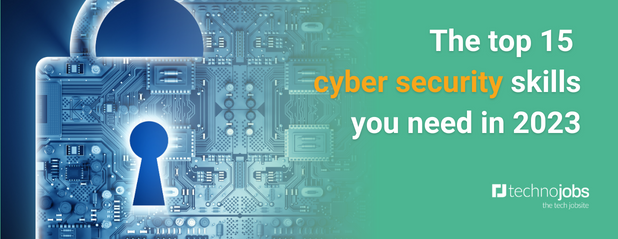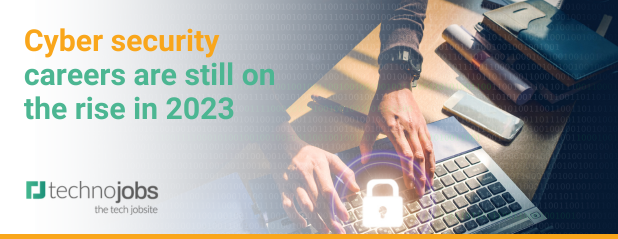The top 15 cyber security skills you need in 2023

Over the past two years, there has been a 291% increase in the demand for cyber security jobs, this is due to the rise in cyber-attacks. Over the past year, 31% of businesses and 26% of charities say they are now experiencing breaches or attacks at least once a week. Therefore they are being urged to strengthen their cyber security practices.
There are many cyber security jobs out there from Chief Information Security Officer (CISO) jobs to Security Analyst jobs, and all of these roles need a similar set of skills to be able to succeed.
We’ve put together a list of the top 15 hard and soft skills needed for a career in cyber security in 2023.
Hard skills for cyber security jobs
1. Cyber Security Frameworks
Cyber security frameworks are sets of standards and guidelines used by cyber security professionals to help manage risks. Depending on the company you work for, they will specify the framework they use. Therefore, the more frameworks you understand the more employable you will become. Some of the most common frameworks include:
- ISO/IEC 27001
- SOC2
- NIST
- GDPR
2. Security Information and Event Management (SIEM)
SIEM is a tool that aids threat detection, compliance, and risk management. It allows companies to collect, monitor, and analyse security data. When using SIEM, you also need to understand data collection, data analysis, and security event management. SIEM allows you to spot vulnerabilities within your cyber security network.
3. DevOps
DevOps is the term used for the tools and methodologies used to manage software processes and deliverability. DevOps relies on automating manual tasks which involves using various tools and therefore increases the number of environments where security risks are raised. So cyber security professionals need to be able to understand DevOps in order to implement security measures into the workflow.
4. Programming Languages
Most entry-level cyber security roles do not require coding skills, however, if you want to progress your career, learning programming languages will help you do that, as it means you will be able to write and understand code. Programming languages can help give you an insight into whether or not there is malicious activity in a particular application. Some of the top programming languages to learn are SQL, HTML, Python, JavaScript, and C.
5. Security Operations & Incident Management
Security Operations and Incident Management involves detecting, recording, analysing, and overseeing security threats, risks, and incidents in real-time. It involves a combination of human investigation and software analysis to detect threats. Once the threat is detected there will be a process of investigation and analysis to assess damages and develop a solution. Often incident management will fall in line with one of the cyber security frameworks we mentioned earlier, depending on the company policies.
6. Network Security & Firewalls
Everyone working in the security industry has to have a basic understanding of network security. A lot of people who previously worked in IT Support often move into cyber security and therefore already have a background in this area. Security Engineers are expected to be highly knowledgeable in this area as they are responsible for designing, implementing, and maintaining network security systems.
7. Roadmaps
A roadmap is a strategic plan that includes the steps you need to take to reach your desired goals. Therefore, creating a cyber security roadmap will give you full visibility of the company infrastructure and will give you a clear understanding of the steps you need to take to ensure all company data is protected. A roadmap will provide you with a full-scale action plan, which will ensure ongoing security for the company network.
8. Cloud Security
As more businesses move their computing and data to the cloud, cyber security specialists need to understand cloud security. Although the information stored in the cloud is more protected than data stored on-site, it is still important to be able to detect any cyber-attacks. Some main causes of data breaches within the cloud include misconfiguration, hijacking of accounts, cloud malware attacks, and many more.
9. Risk Management
Risk management is essential to cyber security as it oversees every aspect of the job role. It involves five steps, including identifying the technology or sensitive data that needs to be protected. Then look at the potential threats and identify the potential consequences and worst-case scenarios. After this, you need to be able to think of the best possible solutions which finally need to be implemented successfully. If threats remain you would go back to identifying solutions until you solve the issue.
10. Ethical Hacking
To be a cyber security specialist, you need to think similarly to how a hacker thinks, that way you have the best way of predicting possible cyber-attacks. Ethical hacking involves an authorized attempt to access unauthorised information in an attempt to see where there are flaws within the infrastructure.
Find Ethical Hacking Jobs here
Soft Skills for cyber security jobs
11. Communication Skills
Cyber security professionals work closely with various teams and will often need to share their findings. Therefore, strong communication skills are essential, both verbal and non-verbal for both emails and when presenting your findings. You also need to be able to articulate your findings in a way your non-technical colleagues will understand.
12. Problem-Solving Skills
In your day-to-day job as a cyber security specialist, problem-solving will be crucial. In this role, you need to be able to produce innovative solutions to tackle difficult information security concerns in a range of current and new technologies as well as digital surroundings.
13. Teamwork Skills
Whether you’re working in a wider cyber security team or in conjunction with various teams, you need to ensure you are all working together to solve issues. To produce these solutions promptly, it is important to understand each team’s unique pain points and to have the same commitment to work together to address them.
14. Attention to Detail
As a cyber security professional, you need to be vigilant in spotting threats and risks. Your role within a company will be helping to protect the sensitive and personal information of both the company and its clients. Cyber attacks can sometimes be exceedingly difficult to detect and more often not these cyber threats are ever-changing, so it’s important to always be alert and aware.
15. Adaptability Skills
Hackers are finding new ways of accessing data and therefore you need to constantly adjust to industry trends and enhance your skills in accordance with the hackers. As organisations become increasingly cautious in preventing cyber-attacks, you may need to be ready to adjust your work to align with your employer's shifting goals.
Cyber security is a great field to get into, especially if you are already in an entry-level role, IT role such as IT Support or Support Engineer. Cyber security not only opens you up to higher paying roles, but it also allows for continual learning, and so it is a great career for anyone who is self-motivated, inquisitive and always wanting to learn more.




